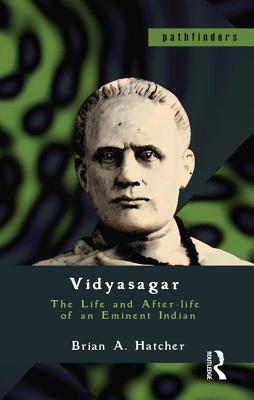

 Routledge Chapman & Hall
Routledge Chapman & Hall
Vidyasagar: The Life and After-Life of an Eminent Indian


Key Metrics
- Brian a Hatcher
- Routledge Chapman & Hall
- Hardcover
- 9781138143241
- -
- -
- History > Asia - India & South Asia
- English
 Secure Transaction
Secure TransactionBook Description
This book offers a new interpretation of the life and legacy of the Indian reformer and intellectual, Ishvarchandra Vidyasagar (1820-91).
Drawing upon autobiography, biography, secondary criticism and a range of Vidyasagar's original writings in Bengali, the book interrogates the role of history, memory and controversy, and emphasises the key challenge of pinning down the identity of an enigmatic and multi-faceted figure. By examining lesser-known works of Vidyasagar (including several pseudonymous and posthumous works) alongside the evidence of his public career, the author calls attention to the colonial transformation of intellectual and social life, the nature of life writing, the limits of standard biographies and the problem of modern Indian identity as such.
Based on decades of research and an original perspective, this book will be especially useful to scholars of modern Indian history, biographical studies, comparative literature and those interested in Bengal.
Author Bio
Brian Hatcher's research focuses on the transformation of Hinduism in colonial and contemporary South Asia, with a special interest in early colonial Bengal. His publications explore issues of religious reform, vernacular modernity, the work and significance of translation, and the colonial life of Sanskrit. An expert on the life and work of Ishvarchandra Vidyasagar, he is also known for his interpretations of "bourgeois Hinduism" and modern Hindu eclecticism.
His most recent book, Hinduism Before Reform (Harvard University Press, 2020), offers the first ever in-depth comparison of the early histories of the Swaminanarayan Sampraday and the Brahmo Samaj. When treated as modern Hindu reform movements, the Swaminanarayan Sampraday and the Brahmo Samaj tend to be trapped within normative frameworks structuring judgments about progress, Hindu modernity, and the place and role of religion in the Indian nation-state.
Hinduism Before Reform asks what we might discover if we were to compare the Swaminanarayan Sampraday and the Brahmo Samaj not as reform movements but as religious polities projected by two innovative religious lords active in the first quarter of the nineteenth century. What might we learn about the articulation of Hinduism during the early colonial period, and how might that enable us to rethink the eventual encompassment of the Swaminanarayan Sampraday and the Brahmo Samaj within an emergent "empire of reform" during the later nineteenth century?
For his next book-length project, Brian Hatcher is seeking to map the spread and chronicle the history of the Dasnami Sampraday in southwestern Bengal between the eighteenth century and the present. Combining field research with textual study, this project aims to chart the rise and fall of an influential set of religious actors who placed their stamp on the landscape and religious life of lower Bengal. Research for this project has been supported by fellowships from the American Institute of Indian Studies and the American Philosophical Society.
During the spring of 2019, Brian Hatcher was the J.P. and Beena Khaitan Visiting Fellow at the Oxford Centre for Hindu Studies.
Watch a video of Brian Hatcher's lecture Vidyasagar: Articulate Subject of the Non-Renaissance", delivered at Victoria Memorial Hall in Kolkata, India on September 28, 2019.
Research Interests
Hinduism and Religion in modern South Asia Religion and Colonialism
Modern Bengal
Education
PhD, Harvard University
MA, Harvard University
MDiv, Yale University
BA, Carleton College
Source: Tufts University
Videos
No Videos
Community reviews
Write a ReviewNo Community reviews